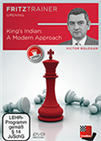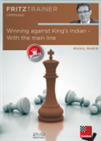No changes at the (very) top
Every sort of possible scenario was on the cards as the last round of the taxing Isle of Man Masters Tournament was about to begin. With the prize money set to be divided between players that share first place, Wojtaszek and Naiditsch knew that, depending on the result, they could finish the day from £15,000 to £50,000 richer — a not-insignificant difference. The four players that comprised the chasing pack were also aware of the big change a win or a loss would have on their "paychecks".
From this group, the first ones to wrap up their game were actually the co-leaders. From a Ruy Lopez, Naiditsch, playing White, created turmoil in the centre and ended up giving up a piece for two pawns:
Naiditsch quickly took on d4 with his knight and collected another pawn after 22...exd4 23.Bxd4 Bf6 24.Bxf6 gxf6:
 The odd-looking move 5….Qe7 is an ideal surprise weapon against the Exchange Variation of the Ruy Lopez. Robert Ris takes a look at possible variations.
The odd-looking move 5….Qe7 is an ideal surprise weapon against the Exchange Variation of the Ruy Lopez. Robert Ris takes a look at possible variations.
Black challenged the open file with 25.Rfe8, but Naiditsch probably entered this variation knowing that he had a perpetual check at his disposal if he did not find anything better. Finally, he decided that his best choice was to force the draw checking the king from g5, f6 or h6 with his queen. The draw was signed on move 30, and the players understood that if none of the chasers won his games, they would face each other again in the play-off.

A nervous start before a very long day | Photo: John Saunders
On board two, Jeffery Xiong drew Gawain Jones after having had a slight pull throughout the game. For both of them, a 6½/9 and shared third place was a good result against such a strong field. Soon after this result was in the books, it was pretty clear that Maxime Vachier-Lagrave at least was not going to win his game against Alexander Grischuk — and in the end, the Russian took the full point. Therefore, the only one who could have joined the 7/9 group was Wang Hao, who had a very slightly unbalanced position against Vishy Anand but could never create enough resources to claim a real advantage.

Xiong and Jones clearly overperformed | Photo: John Saunders
The two players that had arrived in the round as favourites were about to play at least two more games to decide who would take the trophy — it was a fact by then that they would each take home £37.500.

The last game to finish before the play-offs — Kosteniuk beat Sundararajan | Photo: John Saunders
White wins
Radek Wojtaszek had the white pieces in the first blitz encounter of the play-offs. By move 14, Naiditsch had come out of a King's Indian Defence a pawn to the good and seemed to have things under control throughout the middlegame (as much as this is possible in a blitz game). The Azeri won yet another pawn, but Wojtaszek managed to cement a strong knight on d5, with Black's king slightly vulnerable. Then, suddenly, the evaluation turned upside down for Naiditsch:
The computer already gives this position as equal, given White's threats on the f-file. However, after 37...Rxe5? White is the one in the driving seat. The game continued 38.Nxf6 Qe6 39.Nd7 Rxe4 40.Qc3+ Kh6 41.Nxb8 and Wojtaszek had a rook for two pawns. Incredibly, Naiditsch did exactly the same that his opponent had just done some moves ago and, despite being material down, created strong threats against the king:
 Bologan: "If you study this DVD carefully and solve the interactive exercises you will also enrich your chess vocabulary, your King's Indian vocabulary, build up confidence in the King's Indian and your chess and win more games."
Bologan: "If you study this DVD carefully and solve the interactive exercises you will also enrich your chess vocabulary, your King's Indian vocabulary, build up confidence in the King's Indian and your chess and win more games."
Black had already recovered the rook — with a knight fork — and had better-coordinated pieces, but with the kings in the open White could still create threats. At this point, Naiditsch answered to the check with 48...Kg4?, when 48...Qe7 was necessary — after 49.Rd5+ Kg4 50.Rd4+, the black king finds shelter in f3! After that mistake, Black was still in position to go for a draw with an impossible-to-find (in blitz) perpetual check. Instead, there followed 49.Rd4 Kf3?:
The queen fell — this was the huge problem with 48....Kg4 — and Wojtaszek went on to win what was a completely insane first play-off game.
Some famous spectators waiting for the first blitz encounter | Photo: Official site
In game two, Naiditsch needed a win with White and he chose the Rossolimo Variation after his rival went for the Sicilian. Just like in the previous encounter, Arkadij left the opening on top and even managed to use a typical Sicilian manoeuvre:
Naiditsch played 11.Nd5. Radek took the knight and defended as tenaciously as possible against White's onslaught against his uncastled king. However, despite avoiding a quick mate, the Polish grandmaster found himself in a clearly inferior position. After some simplifications, White had a chance to finish his opponent off:
 The Rossolimo Variation 3.Bb5 is considered to be one of the strongest replies to 2…Nc6 in the Sicilian Defence. The fact that the move has been played by practically all the top players proves its popularity and strength. But the most interesting aspect of playing 3.Bb5 is that we force sharp, attacking players who love to have the initiative to forget about the Open Sicilian and to adjust themselves to a new world, one full of positional ideas, manoeuvres and nuances.
The Rossolimo Variation 3.Bb5 is considered to be one of the strongest replies to 2…Nc6 in the Sicilian Defence. The fact that the move has been played by practically all the top players proves its popularity and strength. But the most interesting aspect of playing 3.Bb5 is that we force sharp, attacking players who love to have the initiative to forget about the Open Sicilian and to adjust themselves to a new world, one full of positional ideas, manoeuvres and nuances.
To simply queen with 27.d8Q was enough, but Naiditsch went for the more sophisticated — and inaccurate — 27.Rb1 and now only had a slightly better endgame with a rook and two pawns against two pieces. Wojtaszek did not defend accurately, but the game went on until move 77, when Naiditsch showed he knew how to win with rook against bishop on an empty board:
Black resigned and the play-off was tied. An Armageddon game would decide the winner!

A nice shot from the classical game | Photo: Official Facebook page
Wojtaszek got the white pieces and the obligation to win in order to take home the trophy. The last two games had been won by White, so that might have been a good omen for Radek. Unlike the first play-off battle, Wojtaszek got the upper hand against his opponent's King's Indian Defence. By move 21, he had gained all the positional trumps:
In a classical game, we could pretty much call this a two-result game with White a big favourite to win, but this was Armageddon and there was a lot at stake. Naiditsch, aware of this fact, continued with 21...g5, trying to create some confusion in order to avoid getting positionally crushed. Bravery had been a friend of Naiditsch's throughout the event, but this time it backfired. Wojtaszek played energetically and completely steamrolled Black's position:
 In the classical system of the King's Indian White develops naturally and refrains from chasing ghosts looking for a refutation of Black's set-up. White instead relies on the fact that natural play should yield him a small but lasting advantage.
In the classical system of the King's Indian White develops naturally and refrains from chasing ghosts looking for a refutation of Black's set-up. White instead relies on the fact that natural play should yield him a small but lasting advantage.
White has mate-in-four and Wojtaszek found it immediately: 35.Qe5+ Kg8 36.Qxe6+ Kh7 37.Be4+ and Black resigned without allowing 37...Kg7 38.Qf7#.

Naiditsch resigns making Wojtaszek the new champion | Photo: John Saunders
Wojtaszek earned the trophy after having an undefeated run during the classical nine rounds and showing great tenacity during the play-offs — he had a worse position out of the opening in the first two games. Naiditsch would have definitely been a deserving winner as well, after showing his usual enterprising style during the tournament. The showdown between these two heavy-weight fighters was a nice final touch to a great event!
Marital bliss and other (Russian) stories
Wojtaszek's joy did not end there, as his wife Alina Kashlinskaya finished clear first place amongst the ladies, took home £7,000 and got a GM norm — all during her 25th birthday! It was definitely a good Sunday for one of the best-known — and strongest — chess couples in the world.
Alina's performance was outstanding. She finished on 6/9 after facing higher-rated players in seven out of nine rounds. It was clear that she was in good form when she drew Anish Giri and Vladimir Kramnik in the first two rounds, while her final two wins against 2600-players — Rinat Jumabayev and Samuel Sevian — secured her clear first place amongst the women, in a tournament that makes an effort and manages to attract a lot of strong female players.
 The "Mega" is the database every serious chessplayer needs. The database contains 7.1 million games from 1500 to 2017, in highest quality standard, full of top level analyses and completely classified.
The "Mega" is the database every serious chessplayer needs. The database contains 7.1 million games from 1500 to 2017, in highest quality standard, full of top level analyses and completely classified.
Alina got an impressive last-round win over Sevian | Photo: John Saunders
Kashlinskaya can also be happy for her compatriots Vladimir Kramnik and Alexander Grischuk, who won their final games to end the tournament on 6½/9, in the seven-player group that shared 3rd-9th place. Their victories came against strong opposition as well, as Grischuk defeated MVL and Kramnik beat his old-time rival Alexei Shirov.
Despite not being Russian, Hikaru Nakamura also finished on a high after his loss in round eight. The American also reached 6½ points after taking down Pavel Eljanov.

Grischuk vs MVL with Shirov vs Kramnik in the background | Photo: John Saunders
Round 9 results (top 20 boards)
Final standings (top 20)
| 1 |
10 |
|
GM |
Wojtaszek Radoslaw |
|
|
2727 |
7,0 |
| |
13 |
|
GM |
Naiditsch Arkadij |
|
|
2721 |
7,0 |
| 3 |
4 |
|
GM |
Kramnik Vladimir |
|
|
2779 |
6,5 |
| |
7 |
|
GM |
Grischuk Alexander |
|
|
2769 |
6,5 |
| |
8 |
|
GM |
Nakamura Hikaru |
|
|
2763 |
6,5 |
| |
12 |
|
GM |
Wang Hao |
|
|
2722 |
6,5 |
| |
24 |
|
GM |
Jones Gawain C B |
|
|
2677 |
6,5 |
| |
26 |
|
GM |
Adhiban B. |
|
|
2668 |
6,5 |
| |
29 |
|
GM |
Xiong Jeffery |
|
|
2656 |
6,5 |
| 10 |
2 |
|
GM |
Giri Anish |
|
|
2780 |
6,0 |
| |
3 |
|
GM |
Vachier-Lagrave Maxime |
|
|
2780 |
6,0 |
| |
6 |
|
GM |
Anand Viswanathan |
|
|
2771 |
6,0 |
| |
9 |
|
GM |
Karjakin Sergey |
|
|
2760 |
6,0 |
| |
11 |
|
GM |
Rapport Richard |
|
|
2725 |
6,0 |
| |
14 |
|
GM |
Le Quang Liem |
|
|
2715 |
6,0 |
| |
16 |
|
GM |
Vidit Santosh Gujrathi |
|
|
2711 |
6,0 |
| |
17 |
|
GM |
Artemiev Vladislav |
|
|
2706 |
6,0 |
| |
19 |
|
GM |
Almasi Zoltan |
|
|
2702 |
6,0 |
| |
22 |
|
GM |
Leko Peter |
|
|
2690 |
6,0 |
| |
23 |
|
GM |
Howell David W L |
|
|
2689 |
6,0 |
Games from Round 9
Play-off games
Links
























